
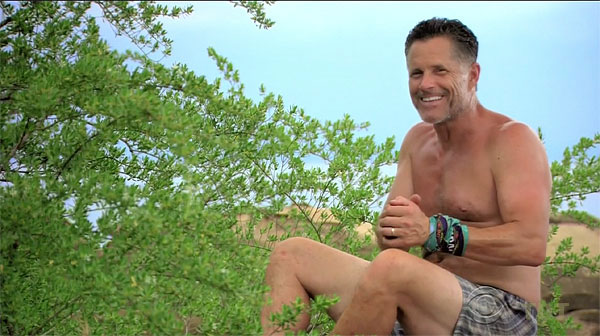
When I watch Survivor, I tend to root for the smart players, the super fans who act rationally. My guess why? Probably because I think I would play like them.
But, for some reason, when Panama first aired, I found myself rooting for Terry. Maybe it’s because he was from Connecticut and I lived in Connecticut at the time? Maybe it’s because Terry took on a clear underdog role that season? Maybe it’s because, beyond Cirie, I didn’t really find anyone playing like I would have? Not sure.
So even though this season I have plenty of people I’m rooting for, in one way or another, I still found myself with a soft spot for Terry, despite the fact that his social game stinks and I don’t think I’m very much like him at all. No matter what you think of him, though, it’s no fun that Terry’s second-chance season ended the way it did after, reportedly, it took so long and so many close calls before he made it back on. But, I think I speak for everyone when saying it’s so great that his son is now doing well.
But once the Terry story unfolded, Survivor still had a really great episode to deliver our way. And it’s an episode that I think is perfect for Edgar Schein’s theory of organizational culture. Schein is a retired MIT professor well known for his work in the field of organizational behavior. I have some hands-on experience with this theory, like I did with the first couple we discussed this season. A big chunk of my dissertation focused on how a digital newsroom’s organizational culture influenced how it operated.
Now, I’m well aware a tribe on Survivor is not technically an organization, but Schein might argue with that. And, I think, for the purpose of this exercise, I might too. The dictionary defines an organization as, “a company, business, club, etc., that is formed for a particular purpose.” When you think about it, a tribe in Survivor could fit that definition. And organizations almost always have some kind of hierarchical structure, some way of organizing that necessitates a leader.
As you can imagine, there are numerous different theories of organizational culture, theories that try to define how organizational culture develops and, specifically, what influences that development. Companies such as Google are famous for trying to create and manipulate a specific organizational culture. Heck, Hollywood made a mediocre movie celebrating Google’s culture.
And that’s where Schein comes in. What separates his theory from others, and why I personally believe his theory to be superior, comes from his focus on leadership. Most theories of organizational culture acknowledge the power of leadership on shaping the culture, but Schein basically argues that leadership is easily the most influential factor and that a good leader… or a bad leader… can really make a large difference on whether that organization prospers or fails. Most of the time we’re talking about businesses, but Schein does not make that distinction. Leadership could also determine, um, coincidentally, whether a tribe in Survivor prospers or not.
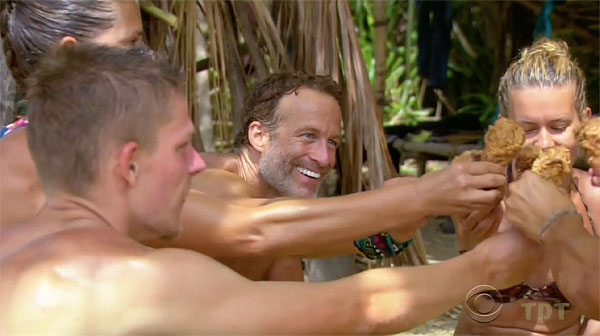
When we examine what went down this week on Ta Keo, it all leads back to leadership. For some reason, no matter what tribe he’s on or what year he’s playing in, Andrew Savage is the leader. At least in his own mind. But Savage always leads the same way, without thinking at all about what kind of leadership best fits the organization and its members. I kind of liken Savage to some awful football coach who doesn’t care what his players are good at, he’s just going to continue making them play the game “his way.” And that often leads to failure. You need the right personnel, of course.
Savage’s style of leadership directly led to Woo’s dismissal, which, of course, also put Savage in a worse position. Instead of trying to cultivate consensus and working with his tribemates to put together a plan for tribal, Savage simply dictated what would happen. He did not ask for input. He did not listen to ideas. He really didn’t even make sure everyone was OK with the plan. That’s never a good idea, especially with an organization like a tribe, one featuring people with like-minded goals, but not the exact same goal.
If Savage thought about the situation better, he may have left tribal council with Woo still in the game and Spencer long gone. But, instead, he upset Ciera, who in turn rebelled against his leadership and, in a sense, blindsided Savage almost as much as she blindsided Woo.

Organization theory scholars argue that ironclad leadership seldom brings strong, stable organizational culture. People need to feel like they have agency, meaning they need to feel like they have some power in how they do their job. They also like to feel like there is an open line of communication that allows them to participate in decision-making processes. It doesn’t matter if this is true, it just matters that people feel like it’s true. The best leaders make others feel wanted and needed. Savage didn’t lead like that. He led in an ironclad manner. It didn’t end well for him and, especially, for Woo.
What’s most odd about the whole situation is, I think, that this leadership style not only worsened the tribe’s organizational culture, but it made organizational members act in a way that was kind of against their best interests. Don’t you guys agree? I’ll explain in my thoughts about each player.
And, of course, that means we’re all done talking about Schein’s theory of organizational culture. Let’s move on to the remaining players:
Ta Keo
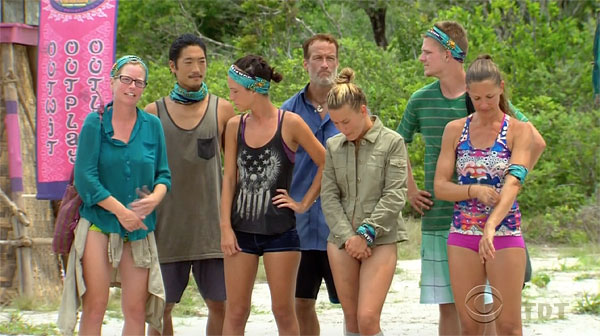
- 1. Spencer — How many close calls can a dude get? Before the season started, everyone identified Spencer as a big threat. Yet, nobody seems to want to get rid of him, even though many chances have come about. I’m still getting the feeling that this is Spencer’s season. He’s still getting the ol’ Winner’s Edit™.
- 2. Ciera — I think Ciera is the person who once voted out her mom. But I now know she’s also playing this season. Man, they didn’t even give us a warning. All of a sudden, Ciera was playing the game. I forgot she was even in the game. I just don’t understand taking out Woo. Why? It makes no sense. Get rid of Savage there. Or Spencer. Ditching Woo makes no sense to me.
- 3. Kass — Damn you, Kass, for teasing us with the return of Chaos Kass and then not delivering. That was mean. But, again, I’ll say the same thing about Kass I said about Ciera: This move doesn’t make sense for Kass. And I give her even more grief for it since she played with Woo and should understand he’s no threat. If you’re going to against the leader, take down the leader. Or, also, Kass should know how threatening Spencer is and should have taken him out.
- 4. Abi-Maria — So Abi ditched Woo finally. While I don’t understand the move for many players. I totally get it for Abi. She’s out for revenge, not to win. Why would she want to win? She’s already a winner. She found a tendon donor for her knee, after all.
- 5. Andrew — Oh, Savage. Maybe he was blinded by all those Playboys on his desk, all those Playboys that implicitly tell him a woman is a sexual being and not a thinking one. Had he treated the women with more respect and didn’t take on a condescending patriarchal role in the tribe, he’d be in a far better position right now.
- 6. Kelly — Besides some truly unfortunate back art, Kelly once again didn’t really appear this week. At some point, Kelly will be eliminated. And when that episode arrives, you just know producers will have to give us some of her confessionals. At this point, I honestly just can’t wait to see how horribly boring they are for producers to be completely making her invisible this season.
Bayon
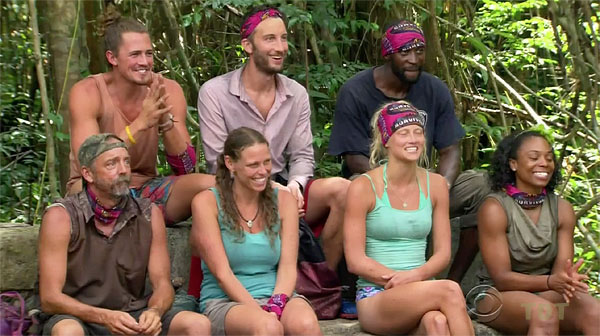
- 1. Joe — Joe made Stephen cry this week. Big bully. Honestly, I really thought Joe would play a much better game this time around, but even though he’s made it pretty far, I kind of think he’s playing a worse game. He really doesn’t understand the definition of the word subtle whatsoever. And, in Survivor, you kind of have to be subtle to win. Which brings me to a not-so-subtle prediction: Joe will not win.
- 2. Kelley — This episode could be setting us up for two different outcomes for Kelley: She’s going to surprise some people with an idol play at Tribal and then waltz toward Final Tribal, or she’s going to get too comfortable with one group and get blindsided herself. I’m not sure if there’s a middle ground.
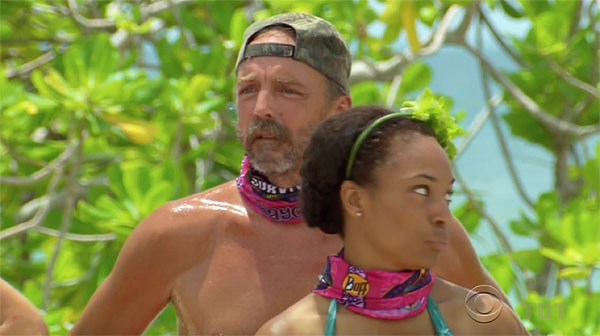 3. Tasha — I have a feeling Tasha is going to be pissed when she finds out people voted off Woo. That was her ace in the hole, I think. Of course, Tasha made me laugh the hardest this week when they showed her face while Joe was oiling himself up. The edit still makes her seem likes she’s going far, but I don’t think she wins, yet I can’t seem to figure what’s going to doom her yet. Tasha is, so far, playing a hell of game, I think.
3. Tasha — I have a feeling Tasha is going to be pissed when she finds out people voted off Woo. That was her ace in the hole, I think. Of course, Tasha made me laugh the hardest this week when they showed her face while Joe was oiling himself up. The edit still makes her seem likes she’s going far, but I don’t think she wins, yet I can’t seem to figure what’s going to doom her yet. Tasha is, so far, playing a hell of game, I think.- 4. Jeremy — There’s only one thing that could derail the Jeremy Train right now: Too much of an insistence on keeping Joe as the tribes move toward the merge and individual immunity challenges. All Jeremy has to do is look toward his alpha-male buddy Savage: His clear insistence on keeping Woo led toward this week’s blindside. Jeremy cannot get comfortable, like he did last time, and think his want to keep Joe, once word gets around about Joe’s obvious scheming, won’t upset the rest of the original Bayon.
- 5. Stephen — Besides crying, Stephen kicked some butt at an immunity challenge. Maybe Stephen’s edit is just one long redemption story and we’re looking at the winner? I sure hope so. But, think about it, just like Spencer, Stephen was allowed to show emotion and articulate what his redemption arc would look like. Maybe producers are setting us up to see said arc?
- 6. Kimmi — Kimmi didn’t eat the brain this week. Last week, Kimmi got loud. Finally, we’ve got the old Kimmi back. We saw the old Ciera this week. Now once Chaos Kass returns, us Second Chance voters will actually have the cast we chose.
- 7. Keith — Keith likes to spit. When his tribe’s winning, he’s spitting. When they’re losing, he’s spitting. You know what was happening back at camp when Stephen cried during his confessional? Neither do I, but I bet Keith was spitting.
And that’s all I got for now. Come back next week for another heaping helping of theoretical musings and bad jokes.
 Pat Ferrucci started watching Survivor when episode two of Borneo first aired. He’s seen every episode since. Besides recapping here, he’ll be live-tweeting this season from the Mountain Time Zone. Why? Because nobody cares about the Mountain Time Zone except when they want to ski. Follow him @patferrucci for Survivor stuff and tweets about anything and everything that enters his feeble mind.
Pat Ferrucci started watching Survivor when episode two of Borneo first aired. He’s seen every episode since. Besides recapping here, he’ll be live-tweeting this season from the Mountain Time Zone. Why? Because nobody cares about the Mountain Time Zone except when they want to ski. Follow him @patferrucci for Survivor stuff and tweets about anything and everything that enters his feeble mind.
- Index of articles
- Pre-season preview
- Ep.1: Vytas, SIT down
- Ep.2: Varner teaches the Old School
- Ep.3: Tasha sets the Tribal agenda
- Ep.4: Abi continues cultivating an irrational gameplan
- Ep.5: Let's get ethical
- Ep.6: Follow the leader... or not
- Ep.7: Framing how it all went down
- Ep.8: Second Chance primed for an incredible end game
- Ep.9: Did Stephen just open or close the gate to winning?
- Eps.10-11: Construction junction, how do you function?
- Ep.12: Spiraling toward what could be an amazing end
- Ep.13: Planning behavior before the finale
- Ep.14: Wrapping up a stellar season